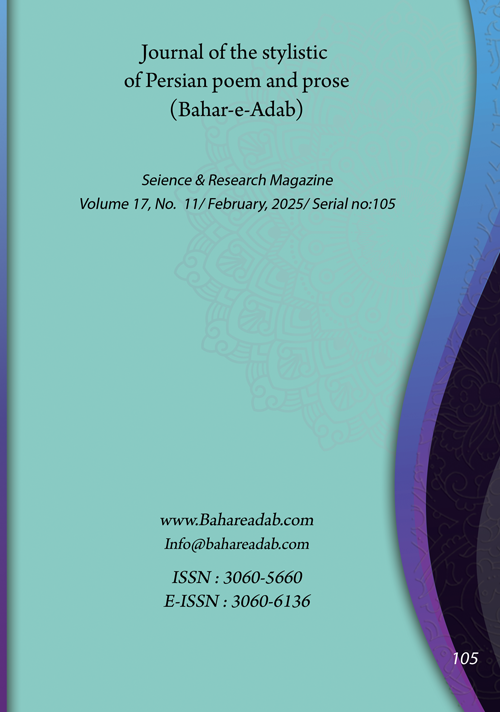- Count View : 343
- آدرس کوتاه شده مقاله: https://bahareadab.com/article_id/1759
- کد DOI مقاله: DOI:10.22034/bahareadab.2025 .17 .7591
Journal of the stylistic of Persian poem and prose
volume Number 17،
number In Volume 11،
،
issue Number 105
The adaptation of moral characteristics-a verdict among the speakers of the khorasani period
Khadije Hosseinpanah , Nahid Azizi (Author in Charge), Hojjatoleh Gh Moniri
Abstract
BACKGROUND AND OBJECTIVES: The background of this research is composed of the hymns of the speakers of the period called the khorasani period, and also the purpose of it is to examine the moral-judicial themes (with direct or indirect influence from the verses of Crimea and prophetic narratives) among the poets of the period.
RESEARCH QUESTION: the present study examines these indicators by asking: What are the prominent moral and ruling indicators in the hymns of poets of the Khorasan period and shows how influenced they were by the verses of Crimea or prophetic narratives.
METHODOLOGY: The research method in this study was descriptive analysis based on library sources.
FINDINGS: What was obtained from the search is that: the poets of this covenant-contrary to the imagination instilled-were not only admirers of the Amir or the minister or descriptors of the Majlis of Aish and Sarwar, but the main topics of their attention were moral, ruling and sometimes mystical themes with the influence (direct or indirect) of the verses of Crimea and prophetic narratives, so that it can be said that the founder of many of these themes in the hymns of later periods was the speakers of this period, among them of course, Ferdowsi and Naser Khosrow have played the top roles.
CONCLUSION: Barry, the results of the study show that: the most attention and focus of poets and speakers of the khorasani period was on moral-judicial issues and in this regard-directly or indirectly-also benefited from the teachings of the Qur"an and narrative, so that it can be claimed that these speakers were the founders of various types of moral, judicial and even mystical themes in the poetry of the Post-Self periods. Of course, among the poets and speakers of the period in question, Naser Khosrow and Hakim Ferdowsi Tosi have contributed the most to the promotion of the topics mentioned.
Keyword
ethics
, wisdom
, poets of the Khorasan period
, verses of the Qur'an
, prophetic and Alawite narratives.
- The Holy Quran
- Nahj al-Fasahe, (1382), translator and provider: Abolqasem Payandeh, fifth edition, Tehran: Javidan. [In
- Ghorar al-Hekam and Durar al-Kalam, (1366), compiled by: Abdulvahed A'medi, translated by: Mohammad Ali Ansari, Tehran: University of Tehran.
- Abu Shakur Balkhi, (2013), Afaarinameh, correction and explanation: Hashem Mohammadi, publisher: Bahmanara.
- Islaminadoushan, Mohammad Ali, (2013), from Rudaki to Bahar, Tehran: Song of Life.
- Dad, Sima, (1371), Dictionary of Literary Terms, Tehran: Marwarid.
- Aslani-Rajeouni, Atefe; Nowrozi Davoudkhani; Asdolahi, KhodaBakhsh; Shadmanaman, Mohammad Reza, (1402), a review of the poetic approach of Nasser Khosrow and Parvin E'tesami to the concept of man and its artistic explanation, Islamic Art Studies Quarterly, Doh 20, No. 49, pp. 36-53
- Razmjoo, Hossein, (1374), literary types and their works in Persian language, third edition, Mashhad: Astan Quds Razavi.
- ---------------------, (1369), Old Persian poetry in the scale of criticism of Islamic ethics, 2nd edition, Mashhad: Astan Quds Razavi.
- Rastgarfasai, Mansour, (1380), types of Persian poetry, second edition, Shiraz: Navid.
- Roudaki-Samarghandi, Abu Abdullah, (1388), Divan of Poems, edited by: Saeed Nafisi, fifth edition, Tehran: Negah.
- Sotoudeh, Gholamreza, (1369), Rostam's appearance in Shahnameh, Tehran: University of Tehran.
- Shamisa, Sirus, (1382), literary types, 10th edition, Tehran: Ferdous.
- ------------------, (1379), poetry stylistics, 6th edition, Tehran: Ferdous.
- Shahid Balkhi, Seyd Ismaeil, (2017), Diwan, edited by Sayyida Shokoofeh Akbarzadeh, Kabul: Andisheh Foundation.
- Safa, Zabih allah, (1370), history of Iranian literature; Summary of the first volume, fourth edition, Tehran: Ferdous.
- Faryabi, Zahir al-Din, (1337), Divan of Poems, edited by: Taghi Binesh, Mashhad: Bastan Bookstore.
- Ferdowsi, Abu-alQasem, (1379), Ferdowsi's Shahnameh, edited by: Saeed Hamidian, Tehran: Qathr.
- Qobadiani, Naser Khosrow, (1378), Divan of Poems, third edition, Tehran: Simai Danesh.
- Kazazi, Jalal-aldin, (1383), Nameh Bastan, Tehran: Ministry of Culture and Islamic Guidance.
- Kasai Marvazi, Majd-aldin Abolhasan, (1370), the life, thought and poetry of Kesai Morozi, edited by: Mohammad Amin Riyahi, third edition, Tehran: Tos.
- Majlesi, Mohammad Bagher ebn Mohammad Taqi, (2013), Bahar al-Anvar, 4th edition, Daral-Ketab al-Islami.
- Walian, Leila; Jamali, Shahrouz; Sadeghi-Shahpar, Reza, (2018), Unity of religion and politics from the point of view of Ruzeh al-Oqool (Marzban Name Bozorg Sasani), Islamic Art Studies Quarterly, 16th year, number 38, pp. 28-7.

